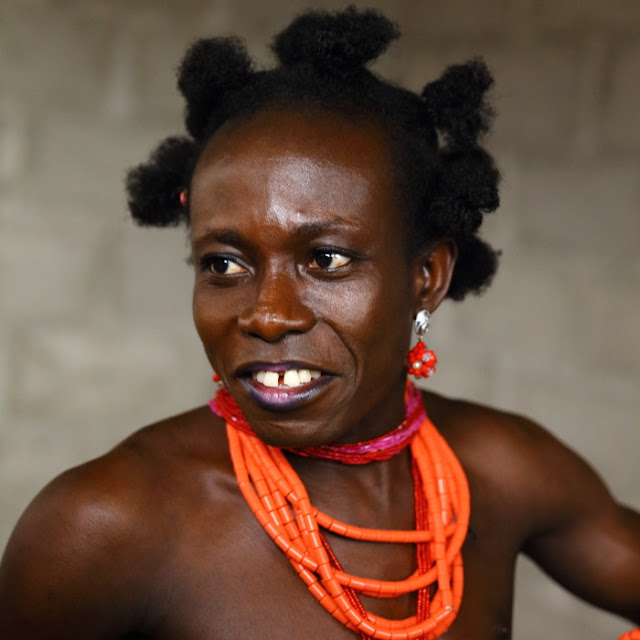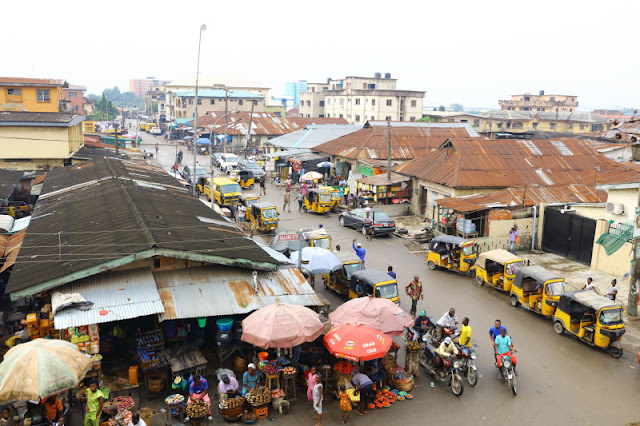 |
| Va-Bene on a crusade for tolerance and respect |
 |
| Va-Bene with make-up |
He was getting dressed-up in an open corner room on the first floor of an construction building overlooking the market of Iwaya, just above the SureBet 247 outlet which had gathered quite a crowd of gamblers, who probably thought they should try their luck in anticipation of Christmas. Va-Bene was perched on women shoes to protect his feet from the concrete rubble that made the floor. And he had brought his make-up in a women handbag.
Migration and sexuality where the master words of the theme of this art performance that would take the shape of a procession led by Va-Bene walking barefoot on the streets of the Iwaya neighborhood followed by his tribe of youth representing migrants (one of them carrying a foam mattress on his head as a symbol of nomadism and homelessness). Va-Bene explained that he wanted to challenge the traditional African societies for their lack of acceptance of migrants and of ambiguous genders. Migration is a very trendy topic nowadays and a sad reality too. This may be why Va-Bene, who has previously explored slavery in various performances back in Ghana, chose to move on to the theme of migration which is considered by some as modern slavery.
Regarding sexuality, his point was that African society does not officially welcome various shades of sexuality. For instance, homosexuality is forbidden in Nigeria. Va-Bene is cross-dressing in an attempt to show that a man dressed as a women is not a bad individual. Gender come in various forms as Facebook found out by uncovering more than fifty segments of gender. Va-bene said he was not gay but he visibly enjoyed women accessoires.
I actually felt that he looked more like a traditional worshipper with his traditional hair style, bare chest, bare feet, plastic coral beads and his deep red loincloth. Make-up (nails, eyes and lips) did not really strike out.
I reflected, from the way he was walking from a resolute and dignified pace on the street, that he looked a bit like yet another prophet preaching his own cult of respect and tolerance to the masses, similarly to Jesus as he was walking on the roads to preach the words of God and gathering followers as he went and performed miracles.
When he was fully dressed up, having put a last touch of Nivea cream to moisture his skin, he moved towards the staircase and briefed the boys who were recruited to follow him. On-lookers from the street had gathered to watch him descend the stairs and go barefoot in the muddy streets ahead of his followers. "Crazy" is word I heard a couple of times, but that was to be expected. Some people looked unconvinced, others had a smile on their face, enjoying the spectacle of this slender looking man walking through the street ceremoniously holding a bowl containing make-up ustensiles.
The performance included some food purchases, Va-Bene would stop and attempt to buy peanuts from a scared Muslim hawker girl who had brought down a tray from her head to pass it on to a boy. She was so scared, or shy, that she refused to sell despite the forceful insistence from men in charge of security for the procession. You don't want to sell? Another hawker did the trade instead. Va-Bene did not utter a word, as if he did not know the language of this foreign land where he had migrated. What mattered was to buy food and share it with his followers. The transactional act was repeated a few times with bread, fried yam etc...
Whether Iwaya will be changed as a result of this procession is a good question. Most people lacked the context to decipher its meaning and purpose, but at least a few salesman did some welcome and unexpected trade!
Migration and sexuality where the master words of the theme of this art performance that would take the shape of a procession led by Va-Bene walking barefoot on the streets of the Iwaya neighborhood followed by his tribe of youth representing migrants (one of them carrying a foam mattress on his head as a symbol of nomadism and homelessness). Va-Bene explained that he wanted to challenge the traditional African societies for their lack of acceptance of migrants and of ambiguous genders. Migration is a very trendy topic nowadays and a sad reality too. This may be why Va-Bene, who has previously explored slavery in various performances back in Ghana, chose to move on to the theme of migration which is considered by some as modern slavery.
Regarding sexuality, his point was that African society does not officially welcome various shades of sexuality. For instance, homosexuality is forbidden in Nigeria. Va-Bene is cross-dressing in an attempt to show that a man dressed as a women is not a bad individual. Gender come in various forms as Facebook found out by uncovering more than fifty segments of gender. Va-bene said he was not gay but he visibly enjoyed women accessoires.
I actually felt that he looked more like a traditional worshipper with his traditional hair style, bare chest, bare feet, plastic coral beads and his deep red loincloth. Make-up (nails, eyes and lips) did not really strike out.
 |
| Iwaya's market area |
When he was fully dressed up, having put a last touch of Nivea cream to moisture his skin, he moved towards the staircase and briefed the boys who were recruited to follow him. On-lookers from the street had gathered to watch him descend the stairs and go barefoot in the muddy streets ahead of his followers. "Crazy" is word I heard a couple of times, but that was to be expected. Some people looked unconvinced, others had a smile on their face, enjoying the spectacle of this slender looking man walking through the street ceremoniously holding a bowl containing make-up ustensiles.
 |
| the purchase of bread |
Whether Iwaya will be changed as a result of this procession is a good question. Most people lacked the context to decipher its meaning and purpose, but at least a few salesman did some welcome and unexpected trade!
Comments
Post a Comment